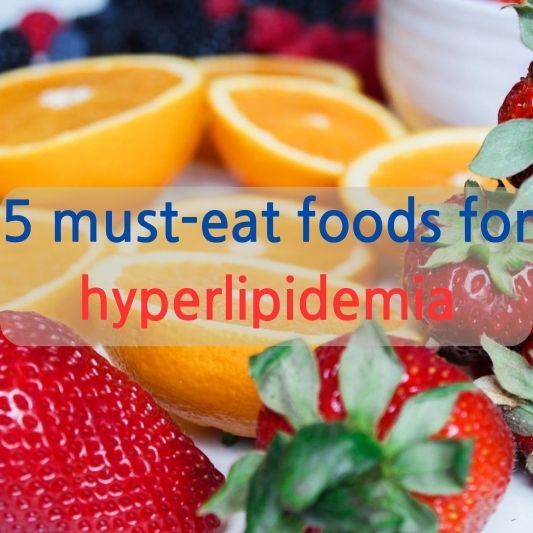Let’s find out about five foods that hyperlipidemia patients must eat. Hyperlipidemia is a disease in which excessive cholesterol or triglycerides are present in the blood. Hyperlipidemia can clog or narrow blood vessels and can lead to cardiovascular diseases such as heart disease, stroke, and arteriosclerosis.Diet is important along with medication to treat hyperlipidemia. If you have hyperlipidemia, it’s a good idea to avoid foods that are high in cholesterol or triglycerides, and eat foods that lower your cholesterol or triglycerides. So, what foods should hyperlipidemia eat? Here are five foods that are helpful for hyperlipidemia patients.

5 must-eat foods for hyperlipidemia
Fruits and vegetables
Fruits and vegetables are rich in dietary fiber, which helps to lower cholesterol levels. In particular, berries, apples, pears, cabbage, and broccoli are effective in lowering cholesterol levels.
Nuts and seeds
Nuts and seeds are rich in unsaturated fatty acids, which help lower cholesterol levels. In particular, almonds, walnuts, peanuts, sesame seeds, and flax seeds are effective in lowering cholesterol levels.
Whole grain
Whole grains are rich in dietary fiber, which helps to lower cholesterol levels. In particular, brown rice, barley, and oats are effective in lowering cholesterol levels.
Fish
Fish are rich in omega-3 fatty acids, which help lower cholesterol levels. In particular, salmon, tuna, sardines, and mackerel are effective in lowering cholesterol levels.
legumes
Peas are rich in protein and fiber, which helps to lower cholesterol levels. In particular, beans, tofu, and natto are effective in lowering cholesterol levels.
Of course, hyperlipidemia patients should avoid foods high in cholesterol or triglycerides. In particular, foods high in animal fat, saturated fat, and trans fat are the main culprits of raising cholesterol levels, so be careful.
If you have hyperlipidemia, it is important to control your cholesterol levels through diet. Please consistently eat the foods introduced above to lower your cholesterol level and stay healthy.
Notes
Patients with hyperlipidemia must consult their doctor to proceed with the diet.
Hyperlipidemia is affected not only by eating habits, but also by various factors such as exercise, smoking cessation, and stress management, so it is important to prevent or treat hyperlipidemia by improving lifestyle habits.
conclusion
If you have hyperlipidemia, it is important to consistently eat the foods introduced above to lower cholesterol levels and keep your health. In addition, you can help control cholesterol levels by paying attention to the following.
- Use less oil when cooking food.
- Avoid fatty foods such as fried food, stir-fried food, and jeon.
- Avoid fast food, instant food, and processed food.
- Exercise more than 30 minutes a day and more than five times a week.
- I quit smoking and manage stress.
FAQ
1. What foods should hyperlipidemia patients watch out for?
Hyperlipidemia patients should avoid foods high in cholesterol or triglycerides. In particular, foods high in animal fat, saturated fat, and trans fat are the main culprits of raising cholesterol levels, so be careful.
Animal fat: pork belly, sausage, bacon, ham, cheese, butter, whipped cream saturated fat: palm oil, coconut oil, animal oil Trans fats: fast food, fried food, instant food
2. What foods should hyperlipidemia patients eat a lot?
Hyperlipidemia patients should eat a lot of foods that lower cholesterol or triglycerides. In particular, foods rich in fiber, unsaturated fatty acids, and protein help lower cholesterol levels.
- Dietary fiber: fruits, vegetables, whole grains, etc unsaturated fatty acids: fish, nuts
- Protein: legumes, tofu, chicken, fish
3. How many meals should hyperlipidemia patients eat a day?
Patients with hyperlipidemia are advised to eat three to four meals a day in a balanced manner. It is recommended to eat snacks between meals with fruits, vegetables, and low-fat dairy products.
4. What exercises should hyperlipidemia patients do?
Patients with hyperlipidemia are advised to exercise more than moderate at least 5 times a week, for at least 30 minutes. Walking, biking, swimming, jogging, etc. are good exercises.
5. How should hyperlipidemia patients manage stress?
It is important for hyperlipidemia patients to manage their stress. Stress can cause high cholesterol levels. It is recommended to find ways to relieve stress, such as meditation, yoga, massage, and listening to music.
Find out how much nutritional supplements can help with hyperlipidemia on iHub!
